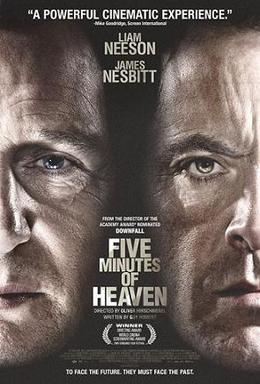
Liam Neeson has morphed somewhat of late, from an actor who
specialized in serious, Oscar-winning films like Steven Spielberg’s “Schindler’s
List” (and was also Spielberg’s first pick at some point for the title role now
occupied by Daniel Day-Lewis in the somber, reverent “Lincoln”) to an actor who
is most likely to be seen in movies like “Taken” and “The A-Team”—both movies
that work well in their own way, but are of a completely different caliber and
intent than much of his previous work. In this most recent portion of his
career, he has successfully reinvented himself as a genuine take-no-prisoners
action star; and, I might add, a much more entertaining and convincing one than
the present-day versions of eighties’ icons Arnold Schwarzenegger and Sylvester
Stallone. But despite this transformation, Neeson still gamely lent his
star-power, talent, and box-office-draw name to a small European release like “Five
Minutes of Heaven”(Pathé, BBC Fims), a film that, although it received some
attention at Sundance in 2009, made a comparatively tiny amount of money in the
US and slipped by virtually undetected.
Neeson stars here as the Irish-Protestant Alistair Little,
who, at the age of 17, killed a Catholic boy named Jim Griffin in his Ulster
home. Little eventually served time in jail and is now rehabilitated and
released. The movie opens with Neeson narrating in an even, dignified, and
straightforward way the specific situation of the 1975 murder and the general
atmosphere of the Troubles. “For me to talk about the man I have become,” he
says, “you need to know about the man I was.” His narration, and the slightly grainy, washed out footage that accompanies it, examines some of the group-think causes of terrorism. The man he was is played by Mark
Ryder, who looks remarkably like a younger Neeson, from the tall, purposeful frame to the
long, narrow nose. His eyes, however, are bright and clear, while the present day Alistair
played by Neeson has a face weighed down by years of regret and melancholy resignation.
Alistair now makes a living speaking about reconciliation, and he is scheduled
to meet Joe Griffin, the younger brother of the man he killed. Neeson expertly conveys
a blend of conflicting emotions: Alistair does want the meeting to take place, perhaps for
his own closure, but is also visibly nervous, and understands and generously insists that the confrontation,
which a TV crew will be filming live, must be completely on Joe’s terms. His crime weighs on him, and he wants more than anything to atone, but he also has made a career out of that attitude, a complication deftly shown when he repeats his opening narration lines to the TV cameras; the words begin to sound like something that has become routine for him. Our awareness of this possibility feeds into our comprehension of and sympathy with Joe's bitterness.
Playing Joe Griffin is another great Irish actor, James
Nesbitt. His name is not nearly as well known as Neeson’s internationally
(although you can currently see him as the comic and roguish dwarf Bofur in
Peter Jackson’s “The Hobbit: An Unexpected Journey”), but his performance is
just as important to the success of “Five Minutes in Heaven,” if not more so.
Joe is a bitter, angry man. He saw Alistair kill his brother over thirty years
ago, and could do nothing, and his mother has blamed him ever since. He stews under a cloud of resentment and simmering ire, barely concealing his own deep
sense of guilt underneath. The film first introduces him sitting in the back of
a long black luxury car as he is driven to the meeting; it is a long tense
scene as Joe keeps flashing back to the fatal event and his mother’s treatment
of him afterward, and wavers on whether he will actually go through with the
confrontation or not. He is completely agitated and distracted, and the scene
is almost painful in its raw emotionality. And this introduction is not even
Joe’s most emotional moment; rather the script pushes him further and further
into the dark corners of his wounded mind, where his desperate lashing out seems
equally divided between Alistair and himself. Joe runs the gamut of emotions in
this film, and every one of them is finely stamped on Nesbitt’s haggard and
vulnerable face. He also gives Joe an irrepressible nervous energy that shows
itself in multitudinous small, quick, intense movements. His mental unease
communicates itself bodily and creates a vivid portrait of a torn and broken
man. The script by Guy Hibbert also gives Nesbitt several powerful monologues to
work with, which he devours with energy, while always making the words sound like
they are coming straight from the mess of Joe Griffin’s inner struggles.
Though at times slow and too dependent on long, play-like talky scenes, this film is a thoughtful drama about terrorism, revenge, and the possibility of forgiveness, elevated by riveting performances from Nesbitt and Neeson.
"Five Minutes of Heaven" (R) **** (Available on Netflix Instant)
No comments:
Post a Comment